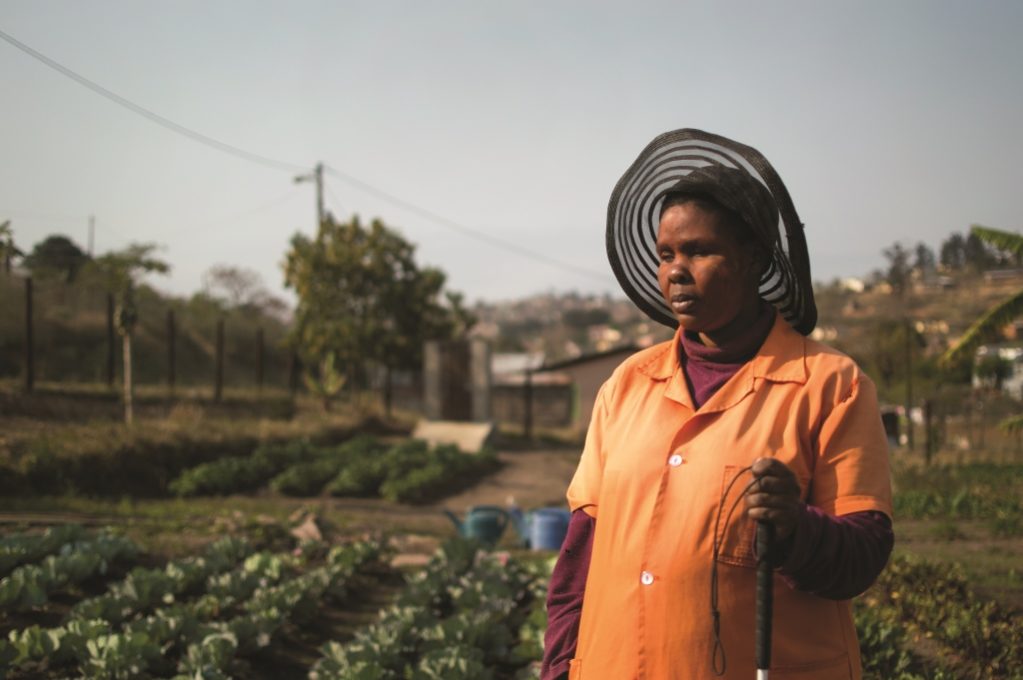Farming is anyone’s game, even if you can’t see.
Forty-five-year-old Nobuhle Mthembu had a severe migraine, aged 10, that cost her her sight.
“I woke up one morning and I just couldn’t see. My eyes were closed. My grandmother washed them with water and my eyelids opened but I have never been able to see since then,” she says.
The business of food has become her solace and living.
In an orange overall, on this cloudy winter’s day in the coastal KwaZulu-Natal province in South Africa, she navigates around the plot with her walking stick. Mthembu can do everything those with sight can, if not more.
“I use my sense of touch to do my work and run this business. Planting is easy and I can do it the same way a person with eyes can, the difficult part is weeding after planting has been done. Because I can’t see, I can’t use tools because I might take out the good too. So I have to use my hands. I touch around the plants and I can feel the difference between weeds and crops and I pull out the weeds.”
Water is pumped into tanks and buckets from a stream, running along the bottom of the plot, to irrigate the crops. Shipping containers are used to store produce.
“Even if we are disabled, there are things we are capable of doing.”
Mthembu has memory as her guide. She spent her childhood watching her grandmother farm.
“I enjoyed being in the fields with my grandmother. I used to cry to help at all times until they allowed me to. I told myself, blind or not, I will farm,” she says.
Because of her zeal, her grandmother gave her a field, the size of half a football pitch, to plant.
“In October, on my birthday month, my grandmother said I should plant peanuts on my section. I was very happy. The peanuts I planted grew and were amazingly big and I noticed that this is my gift, and I could make money from it. ”
“Farming is my thing. I grew up in a family that made its money and food through farming. My grandmother liked farming and I was always with her. Even after she died, I continued with the work,” she says.
Following her dream to make money, in 1989 she started a vegetable garden with her sister, Bukani Latha, who is paralyzed on one side.
“We realized that, as a disabled person, depending on the government doesn’t help because the disabled social grants are not enough and we need to contribute to the economy,” says Mthembu.
She gathered disabled people for a meeting to encourage them into the field. It was a long journey of 10 years.
In 2009, she gained permission from the local council to farm a plot of land at Inchanga, near Cato Ridge in KwaZulu-Natal. She finally founded the 19-member Bukani Sibonelo Disabled Women’s Co-operative. The council helped with seeds.
“This team gives me hope. Every day, we make a difference in our lives and in those of our families, and most importantly we add value in the country by promoting food security through the items we sell,” says Mthembu.
The team grows spinach, cabbage, carrots, potatoes, beetroot and mushrooms. These are sold nearby, given to the needy and supplied to clinics.
Mthembu has won four awards and says they encourage her to work harder.
“I want my work to inspire other disabled people to get involved in agriculture and do the best they can instead of begging on the street.”
Profits and prizemoney are ploughed back.
“We now want to expand our work by supplying major retailers which could bring in good money for us. People may laugh or look down on disabled people but when you offer something valuable, the way they look at you is different,” she says.
Mthembu wants to read braille, there is no doubt she will. She has already proved where there is a will, there is fertile field and a way.
